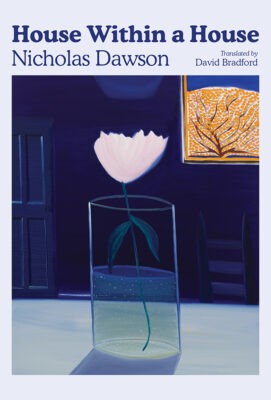D.M. Bradford’s first full-length translation, House Within a House by Nicholas Dawson, is a dazzling and multilingual success. A translation from French to English, but maintaining the original Spanish phrases that appear throughout the text, the work is a meditation on the mediation of language.
Dawson’s speaker tells the story of his depression through a careful weaving of prose poetry, essay, autobiography, and photography. The speaker’s depression is punctuated by the diasporic and queer experience. In a “Translator’s Note,” Bradford says,
It’s not just that I recognize the ongoing, the from-now-on, of depression, and the particulate heritage, the situatedness, of certain human movements and subjectivities. I recognized their plaiting together, the relief and rub of languages inhabited by each other, the run-on motion of the landscape of this all encompassing state, one marked by the personal and the cultural, one that comes and hopefully goes but somehow stays – that shines and craters in the distance.
House Within a House Brick Books
Nicholas Dawson
Translated by D.M. Bradford
$22.95
paper
144pp
9781771316071
Only a babbling, stuttering kind of speech remained, an unrecognizable thing clinging to my skin, a foreign body on my own body, belle façade taillée dans une “langue étrangère.” My mother tongue Spanish, for its part, was still there, still incomplete, instinctive, and awkward as ever, still as connected to my very emotional mother, so prone to flight and melancholy, and pledged as I am to nostalgia.
The book thinks through depression as tied to identity politics and generational trauma, and how the movement from and between the solitary “I” to the collective “We” in poetry and politics can potentially alleviate depression.
Central to the book and to Bradford’s method of translation, too, is how the house functions as a metaphor for depression. Bradford writes, “I was drawn to another, quieter bit of repetition in the book: the house.” Indeed, Bradford effectively emphasizes the domestic space and how it becomes a “space [that] encloses” the speaker, like the depression which envelops him, like “a house within a house.”mRb






0 Comments